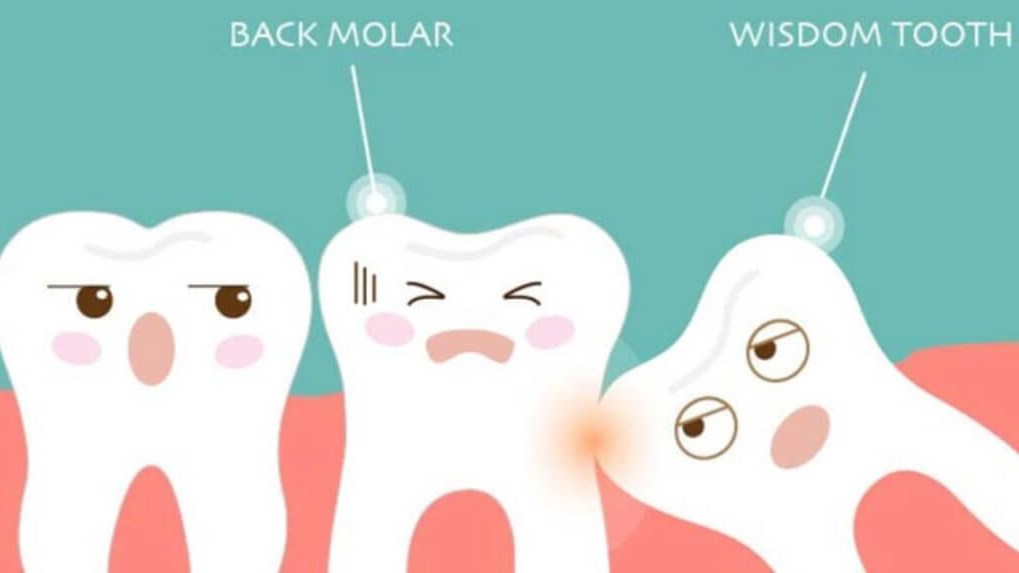Helpful tips and common myths about wisdom teeth, and when to talk to your San Diego dentist about removal
Get Your Wisdom Teeth Checked Out.
In 2007, around five million people got their wisdom teeth extracted in the United States. So if you’re reading this, there’s a good chance you already had yours taken out, or you know someone who has.
Wisdom teeth are the third set of molars that typically come in between the ages of 17 and 21. They earned that name because they grow in when people are older and wiser than when their permanent teeth grew in.
Healthy wisdom teeth give you extra chewing support, but when there’s not enough room for them in your mouth, it can adversely affect your dental health.
So, how do you know when it’s time to get your wisdom teeth removed?
In today’s article, we’ll cover how unhealthy wisdom teeth can affect your dental health, some signs that you need to get yours removed, and what to expect from the extraction treatment at your local San Diego dentist.
We’ll also debunk some common wisdom teeth myths, leaving you with nothing but the pearly-white truth about your third set of molars.
By the time you finish reading, you’ll be all the wiser about how to handle your wisdom teeth and on track to having a happier, healthier smile.
What are the Common Signs to Get Your Wisdom Teeth Removed?
Some discomfort is normal when your wisdom teeth start to come in, but there are several signs to look out for that mean it’s time to visit your dentist in San Diego.
Pain, Swelling, & Trouble Eating
If eating certain foods causes you pain, or if you notice a persistent aching in your jaw even when you’re not eating, your wisdom teeth are likely at the root of the issue and will need to be removed.
Additionally, when your wisdom teeth start to come in, you may notice your gums become swollen and sensitive. This sudden change is often due to openings in the gum tissue left by your erupting wisdom teeth, which allow for food particles and bacteria to get trapped.
To fight the cavity-causing bacteria, your body sends healthy, oxygenated blood to your gums, leading to swelling and increased sensitivity.
If you find it hard to open your mouth or clean near your wisdom teeth due to swollen, sensitive gums, make an appointment with your dentist to get an x-ray and dental exam.
Overcrowding
When there’s not enough room in your mouth or your wisdom teeth don’t come in at the right angle, it can cause nearby teeth to shift and bunch up to make room for them. Overcrowding like this makes it easier for food to get stuck between your teeth and more difficult to clean in those hard to reach areas.
When decay-causing bacteria has a place to grow, cavities are much more likely to form. If you notice your wisdom teeth are causing overcrowding, then it’s time to talk with your San Diego dentist about an evaluation.
Impacted Wisdom Teeth
Wisdom teeth often cause pain and discomfort because they’re impacted. When teeth are impacted, it means there isn’t enough room in your mouth to accommodate them.
The lack of space can cause them to get stuck inside your gums or come in at improper angles. This dental issue can lead to several other complications like overcrowding, cavities, infection, cysts, and even damage to neighboring teeth.
Using x-rays, your dentist can monitor the development of your wisdom teeth before they come in. For some, only two wisdom teeth need to be removed, whereas others need all four taken out. And some get to take advantage of the extra chewing power provided by a complete third set of molars. If your dentist notices any potential troublemakers, they’ll develop a treatment plan that’s best for you and your dental health.
Brushing Away the Myths
Part of being prepared for the development of your wisdom teeth is knowing the difference between fact and fiction.
Many dentists say it’s okay to wait until you experience tooth pain to have your wisdom teeth extracted, but this is a common myth. If your jaw doesn’t leave enough space for you to clean between your teeth when they break the surface, it’s best to have them removed before they cause any problems.
Another common misconception is that if the area surrounding your wisdom teeth isn’t infected, you don’t need to take them out.
Your third molars may not cause any trouble when they first break the surface but partially erupted teeth can leave room for bacteria to enter the gums. If left unchecked, this bacteria can lead to infection, causing pain and stiffness in the jaw.
When it comes to infection, playing catch up is never a good idea. It’s always better to take a proactive approach to your dental health.
To wrap up our list of myths, some people are under the impression that all wisdom teeth are bad and should be removed. Although most of us have to get at least two removed, not all wisdom teeth deserve a bad reputation.
More often than not, the bottom two cause the most trouble while the top two come in without much issue. It’s worth noting that before your wisdom teeth come in, the only way your dentist can tell if they’re impacted or likely to cause problems is by taking x-rays.
It’s essential to get regular checkups and x-rays at your San Diego dentist to stay ahead of any potential issues.
Preventive, proactive care is vital to maintaining a healthy smile. At Dental Express, we carefully monitor wisdom teeth progression and remove any especially risky teeth before they cause any trouble.
Wisdom Teeth Extraction: What to Expect
If your dentist decides that removal is the best option, wisdom teeth extraction is a straightforward treatment that usually takes a single visit.
If your wisdom teeth have already grown in, then the process is as simple as a typical tooth extraction. If you have any impacted teeth, your dental professional will surgically remove them from your gums.
Wisdom teeth extraction is generally a pain-free process thanks to local anesthesia, but if the thought of getting your teeth pulled gives you nightmares, don’t worry. You can talk to your dental professional about the possibility of sedation.
What’s the recovery process like? And how long will it take?
Unfortunately, the healing process isn’t quite so easy. Discomfort, swelling, aching pains, and a soft food diet are common parts of the journey back to health. But if you follow your dental professional’s instructions, your recovery should be relatively speedy.
You’ll usually be prescribed medication to relieve any aches and pains as well as an antibiotic, and you can use cold compresses to ease the swelling. Sticking to soft foods and liquids will help prevent unnecessary damage to the gums until they heal enough to allow for a natural diet again.
Smoothies are a simple and delicious way to get your nutrients in while recovering from wisdom teeth extraction. It’s also a great excuse to eat a lot of mashed potatoes!
The main thing to watch out for during the recovery process is dry socket. After a tooth extraction treatment, a blood clot usually forms where the tooth used to be. This clot serves to protect the vulnerable bone and nerves while the area heals over.
Dry socket occurs when the blood clot can’t form or an already formed clot becomes dislodged. This condition usually happens when the area is damaged by solid food particles or when the patient smokes or drinks through a straw.
The suction created by smoking and using straws is enough to disrupt the formation and stability of blood clots. Because of this, your dentist or oral surgeon will typically recommend avoiding these activities.
As you can imagine, when the bone and nerves are exposed, it can be quite painful. It can also lengthen the recovery process, as the extraction site will need more time to heal over again. But not to worry, dry socket can be easily remedied with a dental cleaning, medicine, and time.
As long as you adhere to the recovery guidelines your dental professional provides, you shouldn’t have to worry about developing dry socket. The majority of patients recover quickly, without any issues at all!
The average recovery time for someone between seventeen and twenty-one years old is around one week. But for someone over the age of thirty, it can take much longer. As you age, your mouth takes longer to heal after treatments like wisdom teeth extraction.
That’s why it’s important to get your wisdom teeth evaluated at your San Diego dentist as early as possible. The sooner you identify potential issues, the sooner you can get them removed to avoid future pain and longer recovery times.
A Wise Choice for Family Dental Care in San Diego
We specialize in proactive family dental care at Dental Express and believe dental health should never be a game of catch up.
When it comes to wisdom teeth extraction or any treatment you may need, our goal is simple: To clear your path to a difficulty-free, healthy mouth. Placing a strong emphasis on prevention, we work to improve your smile’s longevity by catching issues before they come up.
If you live in the San Diego area and you’d like to learn more about wisdom teeth extraction, or you’d just like to drop by for a visit, make an appointment with us today. We have six locations in the San Diego area, and we’d be happy to serve you in any way we can.
Sources
Should I Have My Wisdom Teeth Extracted?
The 5 Most Common Problems Created by Impacted Wisdom Teeth

